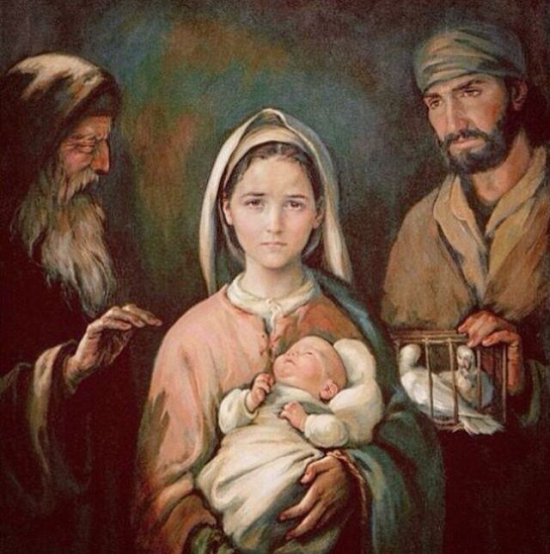
[[[ /// This post is dedicated to “Tiny”, a veritable mountain of a man, the Sasquatch if there ever was one (RIP). He came to the parish wanting to become the littlest child so that he could enter the Kingdom of Heaven. He was, for 28 years, bounty-hunted by all the cartels from South America to Mexico. He’s the guy who kept our US SOF safe. On the one hand, he was always trying to up my Jason-Bourne-esque skills. On the other hand – to the point – having sat me down, with almost knock-down drag-out GTMO-esque interrogational insistence, however respectful, he would try to get me to make him better understand the Presentation of the Baby Jesus in the Temple. Even if I can go on for hours about the Temple, Simeon, Anna… I understand nothing and so failed thrice and this over, say, eight months. Soon after the third failure, I was able to get him Last Rites in ICU, very quickly after which he died. It was almost his dying request that I get to know the Sacred Mystery of the Presentation of Jesus in the Temple. Every time I’m praying the fourth Joyful Mystery I beg heaven for some smidgeon of understanding. It seems to me that Tiny got an audience with our Blessed Mother in heaven, and, not forgetting me here on earth, asked that I get this smidgeon. A “tiny” bit, as small as a tear, was given to me while preaching on 2 February, 2024. The above picture, by happenstance, was “texted” to me some hours later. It perfectly expressed what I had in my sermon. /// ]]]
The Circumcision of Jesus took place 8 days after the Birth of Jesus. Melded to that timeline are another 33 days, together constituting the famous 40 days, later the 40 days of Jesus’ fasting in the desert, calling to mind the 40 years of the Exodus and the 40 years from the start of Jesus’ public ministry to the destruction of Jerusalem in 70AD.
The Fourth Joyful Mystery of the Rosary, the Purification of the Blessed Virgin Mary, aka, the Presentation of Jesus in the Temple, is liturgically celebrated on 2 February, carrying the nickname Candlemas, at the beginning of which candles are blessed and, traditionally, there is a procession with lit candles. The light of the candles represents the Light of Christ, the Son of the Living God, the Eternal Logos, the Eternal Word now Incarnate, said by Simeon during that Presentation of Jesus to be the Luman gentium, the Light of the Nations.
Simeon prophesies: Jesus is the great Sign of Contradiction to be spoken against, a description of Someone already condemned to death. Simeon insists: Jesus will bring about the rise and fall of many in Israel, Someone who is, therefore, already on the execution roster. Simeon, for the third time, thus proclaims that a sword of sorrow will pierce the soul of His Mother, sundering her Immaculate Heart. He is entirely aware of the solidarity of the Mother with her Child.
Mary has already been living these realities as the Tabernacle of the Most High, the Holy of Holies for nine months and then forty more days. She knows what is in store for her Son. But it is a consolation that there is someone else who understands. But must it all be so very accelerated with the likewise ancient-of-days Anna so very publicly speaking of Jesus to all who are awaiting the Redemption of Israel, Jesus being the Messiah, the Suffering Servant, who will bear the punishment of our sins upon Himself? Everything at this presentation of Jesus speaks of the death of Jesus.
Moses prescribed some details for the liturgy of the presentation of any first born son, the holocaust offering of a beast along with a sin offering. This is how the first born son would be “redeemed” and the mother purified. Otherwise the first born son would have to be sacrificed while the mother remained ceremonially unclean. But the sacrifice of the first born son was not an option because any first born son is already destroyed by original sin and cannot be the longed-for vicarious atonement promised in Genesis 3:15, wherein we read of the First Born of all creation, the eternal Son of the Living God, Incarnate of the Woman, the Mother of the Redeemer, who takes the initiative to reach out His heel to crush Satan’s power while He Himself is crushed on the heel for us. In that birth of the First Born of all creation, the only begotten of our Heavenly Father, there is no uncleanness, no original sin, but the death of this First Born is necessary for our vicarious atonement. She knows it. Even if Jesus is redeemed by a couple of turtledoves or two young pigeons, He is one First Born Son who must die for us. Any mother is to be purified for having passed on original sin, but she must undergo the purification rite for the sake of her intercession for all of us.
That painting above… who’s the artist? Brilliant… The trauma is already sundering her Immaculate Heart. Did you notice the tears in the painting above. Very perceptive of the artist. This young Mother, the Immaculate Virgin Mother of God, holds Jesus, who looks up to her. She is holding Him with the older, stronger hands of that Woman, who, 33 years later, would hold the very dead Jesus. This scene of the Presentation is, as it were, the Pietà early on, prophesying the fulfillment under the cross. In both events, she is looking to us:

In the painting up top, at the Presentation of Jesus, Mary is not so much paying attention to the great words spoken by Simeon or, immediately after, Anna. Those words are for us to hear while she lives them, she begging us to live them with her. She beckons us to be with her, in solidarity with her and, therefore, with Jesus.
If there is joy with this fourth Joyful Mystery of the Rosary, it is that God is intervening in our sorry, dark history. But there is also the trauma of how this mercy is founded on God’s own justice, He standing in our place, innocent for the guilty, taking on the punishment we deserve for our sin so that He might have the right in His own justice to have mercy on us. Mary asks us:
- Do we understand?
- Will we accompany her being in solidarity with Jesus who is so earnestly starting His trek to the Cross?
- Or are we oblivious to what is happening here?
Let’s review:
Original sin brings the punishment of death for us all. We deserve to die. In fact, God is entirely within His rights, as it were, to kill us all off, and He does. Did you notice? We all die. But, get this, God is entirely within His rights, as it were, if He were to command that we, for instance, for the sake of pedagogy, kill off our first born sons in mockery of the uselessness of us trying to redeem ourselves, forgive ourselves, by having the pretense of coming up with a vicarious atonement for ourselves. We can’t. We just continue to murder our own, uselessly. Will we ever look to God intervening in this world as our vicarious atonement?
God does command this, just one time, does not allow the sacrifice to happen, but then sacrifices His own Divine Son, the Lamb of God who takes away the sins of the world.
Behold, Abraham is promised a progeny through Isaac, who will be his first born son, that is, with his own wife. The progeny will not come through Ismael, the son of the slave woman. But Abraham, so very old, mocked God, laughed at God for 25 years: Ismael is good enough; you can’t give me a son as my wife and I are too old. Finally Abraham believed not because he believed on his own, but because by the grace given to him he believed, becoming our father in supernatural faith.
When God commanded Abraham to sacrifice his long-awaited first-born son Isaac, just now at the age of being able to become a father, Abraham knew…
- … that God could command this in justice because of original sin, because of which all are already under the death penalty,
- … that his son Isaac wasn’t worthy for this very reason to be a vicarious sacrifice except as a pedagogical instruction about how evil we are apart from God,
- … that his son Isaac would instantly rise from the dead, for the progeny had to come though Isaac.
Consonant with this, but adding more, God stays Abraham’s hand, and provides a lamb, a ram caught by its horns in a bush, the sacrificing of which would look forward in time to when the Innocent Lamb of God who takes away the sins of the world would become the vicarious Sacrifice for us all, Jesus, the First Born of all creation, the only begotten of God the Father, God from God, Light from Light, True God from True God.
Meanwhile, because of Abraham’s long-time lack of belief that the God of life could bring life about, he and his progeny are punished most graphically with circumcision. The horrific irony that Jesus, the author of life, would have to undergo this punishment of circumcision, standing in our place, Innocent for the guilty, is an irony carried by Jesus’ Mother already for 33 days by the time His Presentation comes around.
But the punishment is two-fold. Abraham’s progeny will also have to be enslaved in Egypt for many centuries. While forcing Pharaoh to let God’s people go, there is the event of the Passover. God’s people have the blood of the lamb drenching the doors of their houses and the angel passes over their houses, not killing their first born sons, but only the first born sons of the Egyptians, including Pharaoh’s first born son. The exodus follows. Everyone is then looking forward to the Lamb of God who takes away the sins of the world, the Messiah, the Suffering Servant, the Divine Son of the Living God.
When Mary presents Jesus in the temple, she is carrying the weight of all the sin of all mankind, from Adam until the last man is conceived. She is carrying the weight of the glory of God standing in our place, Innocent for the guilty. She is carrying the fulfillment of the entirety of the purpose of the creation of the heavens and the earth. She is soooo very traumatized.
While we keep Mary company, as she said, meditating on the Mysteries of the Rosary, we not come up with complicated, academic discourses on exegetical fineries. It is enough to put yourself into what’s happening, and allow yourself to be in solidarity with Immaculate Mary.












